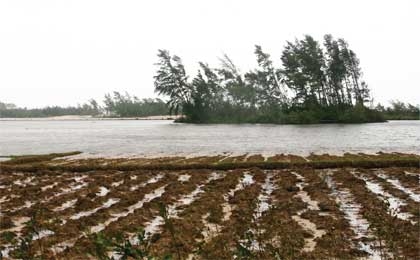Climate change to worsen food security, UN talks told
 |
| photo - vir online |
Between 2010 and 2050, the price of corn, also called maize, could rise by 42-131 per cent, that of rice by 11-78 per cent, and that of wheat by 17-67 per cent, the International Food Policy Research Institute (IFPRI) said.
These prices are dependent on a range of 15 scenarios whose factors are the state of the global economy, population growth and changes in rainfall and global temperatures, the think-tank said.
"Climate change will cause lower rice yields all over the world in 2050, compared to a future without climate change," IFPRI warned.
"One of the climate change scenarios results in substantial declines in maize exports in developed countries, but small increases in yields in developing nations. Wheat yields will fall in all regions, with the largest losses in developing countries."
The report said that investing in agriculture in poor countries now was a key to easing the problem. Farmers that have more income have a better chance of coping with droughts, floods and other climate shocks.
"Many have made the case that we have to address climate change to fight poverty. We are saying you must address poverty as a key part of climate change adaptation, and you must do it now," said Gerald Nelson, who co-authored the report.
"Once the most serious effects of climate change kick in, it will already be too late to respond effectively," he said.
Beyond 2050, predicting the temperature rise is more difficult but even so the challenge to food security is "likely to increase," the report said.
"All scenarios now show average temperature increases by 2050 to be on the order of one degree Celsius (1.8 degrees Fahrenheit). After that, they diverge dramatically, ranging from 2C to 4C (3.6-7.2F) by 2100. Yields of many more crops will be severely threatened."
The report adds to a series of warnings by researchers and watchdogs about the impact of climate change on food supplies as the world's population continues to grow fast.
The current global population of around 6.9 billion will rise to between 7.959 billion and 10.461 billion by 2050, with a mid-estimate of 9.15 billion, according to UN calculations.
The increase will be determined mainly by economic factors. Rising prosperity in poorer countries prompts many families to have few children.
The talks in Cancun are taking place under the flag of the UN Framework Convention on Climate Change (UNFCCC), gathering 193 countries plus the institution of the European Union (EU).
Negotiators, meeting until December 10, are seeking to find agreement on how to curb heat-trapping carbon emissions and devise ways of channelling hundreds of billions of dollars in aid to climate-vulnerable countries.
On Monday, as the talks opened, the UN's Special Rapporteur on the Right to Food, Olivier De Schuetter declared in Geneva that as many as 600 million more people could be put at risk of hunger by 2020 because of climate change.
On November 5, Tang Huajun, deputy dean of the Chinese Academy of Agricultural Sciences, warned production of rice, wheat and corn could fall by five to 10 per cent by 2030, and by 37 per cent in the second half of the century.
"Agriculture has been the worst hit by climate change and some negative effects have become more obvious due to rising temperatures and water shortages over the past 10 years," Tang told the official China Daily.
IFPRI, a Washington-based think-tank on food problems, is financed by the Consultative Group on International Agricultural Research (CGIAR), gathering 64 governments, private foundations, and international and regional organisations.
What the stars mean:
★ Poor ★ ★ Promising ★★★ Good ★★★★ Very good ★★★★★ Exceptional
Related Contents
Latest News
More News
- Foreign fruits flood Vietnamese market (December 09, 2025 | 13:22)
- Vietnam’s fruit and vegetable exports reach $7.8 billion in first 11 months (December 05, 2025 | 13:50)
- Vietnam shapes next-generation carbon market (November 26, 2025 | 15:33)
- PM urges Ho Chi Minh City to innovate and remain Vietnam’s economic locomotive (November 26, 2025 | 15:29)
- Experts chart Vietnam's digital finance path: high hopes, high stakes (November 14, 2025 | 10:56)
- Vietnam’s seafood imports surge 30 per cent in first 10 months (November 10, 2025 | 19:35)
- Vietnam’s durian exports hit $1 billion milestone (October 30, 2025 | 17:41)
- Beyond borders: Sunhouse and new era of Vietnamese brands on Amazon (October 28, 2025 | 10:46)
- Record-breaking trade fair set to open in Hanoi (October 15, 2025 | 15:59)
- Timber sector seeks solutions to VAT refunds (October 14, 2025 | 18:58)

 Tag:
Tag:




















 Mobile Version
Mobile Version